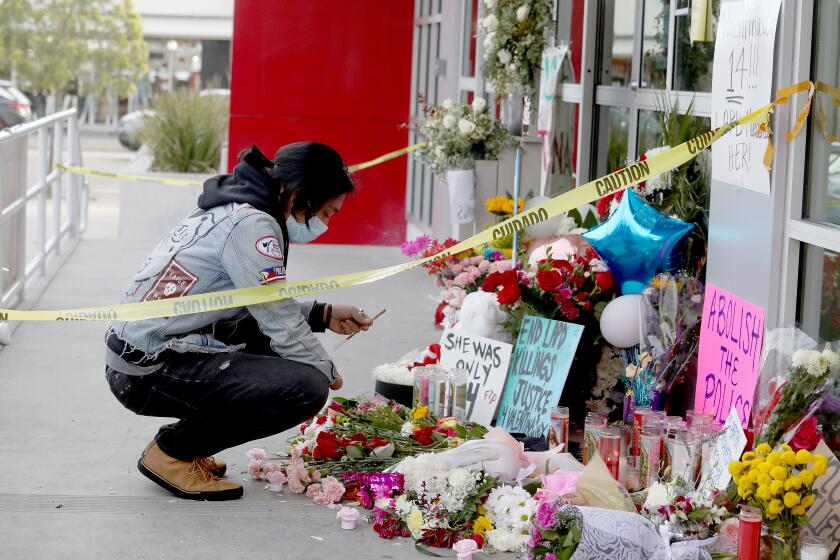U.S. won’t interfere with states on marijuana sales
In a significant policy shift by the Obama administration, U.S. Atty. Gen. Eric Holder signaled Thursday that the federal government would no longer interfere with states that allow commercial marijuana sales as long as they were strictly regulated.
The move comes two years after the Justice Department said federal drug agents would not tolerate large-scale or commercial pot businesses and launched a campaign to shut down dispensaries and growers. The crackdown was particularly aggressive in California, where hundreds have been shut down.
The new policy suggests the federal government is trying to find a workable balance between federal law, which prohibits all marijuana use, and laws in a growing number of states such as California that permit it.
Holder informed the governors of Colorado and Washington — where voters in November passed ballot measures to legalize marijuana for all adult use — that the Justice Department would not move to halt those initiatives.
Meanwhile, Deputy U.S. Atty. Gen. James M. Cole wrote a memorandum to his top prosecutors around the country emphasizing that they should not automatically target marijuana operations solely because they operate for profit and on a large scale.
“I was expecting a yellow light, but this light looks a lot more greenish than I had expected,” said Ethan Nadelmann, executive director of the national Drug Policy Alliance, a group advocating an end the so-called War on Drugs. “The White House is essentially saying proceed with caution.”
He said the ramifications will be felt even in other countries, such as Jamaica and Uruguay, where officials feared their legalization initiatives would be squelched by pressure from the U.S.
Beau Kilmer, co-director of the Rand Drug Policy Research Center, said that while it was “a big deal” that the memo did not prohibit commercial, for-profit production, its scope was limited. It did not legalize marijuana at a federal level, left the U.S. attorneys plenty of discretion to prosecute, and focused only on the Justice Department.
“There are other federal agencies and departments that can play a role in all this. You’ve got the IRS, the Treasury, Customs … It’s important to recognize that the federal government is not just a homogeneous actor,” Kilmer said.
It’s unclear how the change in policy will affect California, where the medical marijuana industry started but remains largely unregulated.
The memo suggests that little might change in the state unless Sacramento implements some rules for the industry. “The Department’s guidance in this memorandum rests on its expectation that states and local government … will implement strong and effective regulatory and enforcement systems,” Cole wrote.
California’s rules on medical marijuana are murky to nonexistent. While certain counties and cities, such as Oakland, have created clear regulatory schemes, Cole repeatedly calls for “state regulation.”
“This is a mandate for California to regulate medical marijuana,” said Dale Gieringer, a longtime activist and director of CalNORML.
A regulatory bill died in the state assembly over a procedural issue in May. State Assemblyman Tom Ammiano (D-San Francisco) hopes to reintroduce it, and key activists are hoping to put an initiative on the 2016 ballot that would regulate all marijuana.
Steve DeAngelo, who operates Harborside Health Center in Oakland, one of the largest dispensaries in the nation, called it “a huge step forward for a sane policy on marijuana,” but worried about the details.
“It looks very, very promising on the face of it. But we won’t know the effects until it’s interpreted by the U.S. attorneys,” DeAngelo said.
Melinda Haag, the U.S. attorney in San Francisco, filed papers last year to seize the properties where Harborside operated, and said in a statement at the time that “superstores like Harborside” went beyond what the state law allowed, implying its size was the key issue. She has also targeted growers in Northern California.
Cole’s memo didn’t address the other methods the federal government is using to put cannabis purveyors out of business.
“We’re still facing crippling tax assessments, seizure of our properties, denial of banking, credit cards, security and armed car services,” said DeAngelo.
ALSO:
Crews spark their own fires to cut off path of Yosemite fire
State academic performance slips, but L.A. Unified improves
Court upholds law banning therapy to change sexual orientation
More to Read
Start your day right
Sign up for Essential California for news, features and recommendations from the L.A. Times and beyond in your inbox six days a week.
You may occasionally receive promotional content from the Los Angeles Times.








